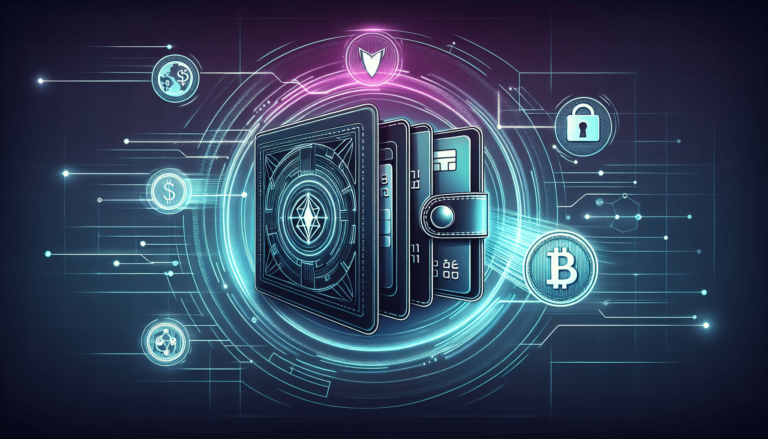The Role Of Blockchain In The Cryptocurrency Ecosystem
Have you ever wondered how cryptocurrencies like Bitcoin and Ethereum work behind the scenes? Well, it’s all thanks to the revolutionary technology known as blockchain. In this article, we will explore the crucial role blockchain plays in the cryptocurrency ecosystem. From ensuring secure and transparent transactions to enabling decentralized networks, the blockchain has transformed the way we handle digital currencies. So sit back, relax, and let’s uncover the fascinating world of blockchain and its significance in the world of cryptocurrencies.
Enhancing Security and Trust
Decentralized Network
Blockchain, as a decentralized network, plays a crucial role in enhancing security and trust in transactions. Unlike traditional systems that rely on a central authority, blockchain operates on a distributed network of computers called nodes. Each node contains a copy of the blockchain, ensuring that no single entity can manipulate or control the system. This decentralized nature makes blockchain highly resilient to hacking and tampering, as any changes would require consensus from the majority of nodes.
Immutable and Transparent Records
One of the key features of blockchain technology is its ability to create immutable and transparent records. Every transaction or piece of data added to a blockchain is timestamped and linked to the previous block, forming a chain of blocks. This process ensures that once data is recorded on the blockchain, it cannot be altered or deleted without the consensus of the network participants. The transparency of blockchain also allows individuals to verify and audit the transaction history, fostering trust in the system.
Elimination of Third-Party Intermediaries
Blockchain technology eliminates the need for third-party intermediaries such as banks or payment processors. Traditionally, these intermediaries have been responsible for verifying and approving transactions, which can often be time-consuming and costly. With blockchain, transactions can occur directly between parties, cutting out the middlemen. This not only reduces the overall costs of transactions but also increases security as there are fewer opportunities for manipulation or fraud by intermediaries.
Facilitating Peer-to-Peer Transactions
Direct Transfers
One of the major advantages of blockchain technology is the facilitation of direct peer-to-peer transactions. With blockchain-based cryptocurrencies like Bitcoin or Ethereum, individuals can transfer digital assets directly to one another without the need for a trusted third party. This enables faster and more efficient transactions, as there is no need to go through intermediaries or wait for traditional banking processes.
Reduced Transaction Fees
Blockchain technology also brings the benefit of reduced transaction fees. Traditional financial institutions often charge high fees for various transactions, such as international transfers or cross-border payments. Blockchain-based transactions, on the other hand, have significantly lower fees since they cut out the intermediary fees associated with banks or payment processors. This reduction in transaction fees makes blockchain an appealing option for individuals and businesses looking to save costs when conducting transactions.
Fast and Efficient Cross-Border Payments
Cross-border payments have traditionally been plagued by long processing times and high fees. However, blockchain technology has the potential to revolutionize cross-border payments by offering a fast and efficient solution. With blockchain, cross-border transactions can be executed in a matter of minutes, compared to the days or even weeks it typically takes using traditional banking systems. Additionally, by eliminating intermediaries, blockchain reduces the associated costs, making cross-border payments more affordable and accessible to individuals and businesses of all sizes.
Enabling Tokenization
Creation and Management of Digital Assets
Blockchain technology enables the creation and management of digital assets through tokenization. Tokens can represent a wide range of assets, such as cryptocurrencies, digital collectibles, or even real-world assets like real estate or stocks. By digitizing these assets and representing them as tokens on a blockchain, ownership and transferability can be easily facilitated in a secure and transparent manner. This opens up new possibilities for fractional ownership and investment opportunities, even for traditionally illiquid assets.
Fractional Ownership
Blockchain-based tokenization allows for fractional ownership, enabling individuals to invest in assets that were previously inaccessible due to high costs or limited availability. For example, through tokenization, a piece of real estate can be divided into smaller tradable tokens, allowing multiple investors to own and profit from it. This democratization of ownership unlocks new investment opportunities, as individuals can diversify their portfolios and invest in a wider range of assets.
Enhanced Liquidity
Tokenization also brings enhanced liquidity to traditionally illiquid assets. By creating tokens that represent these assets, individuals can buy, sell, and trade fractions of the asset easily on blockchain-based platforms. This newfound liquidity makes it easier for individuals to monetize their assets or access capital by selling tokens, ultimately improving market efficiency and unlocking value in previously untapped markets.
Supporting Smart Contracts
Self-Executing Agreements
Smart contracts are self-executing agreements coded onto a blockchain. They automatically execute predefined actions once specific conditions are met, without the need for intermediaries. This eliminates potential delays, inconsistencies, or disputes that can arise from traditional contract execution. Smart contracts provide increased efficiency and reliability by automating the execution of agreements, ensuring that all parties involved fulfill their obligations.
Automation of Processes
With smart contracts, various processes can be automated, streamlining operations across industries. For example, supply chain management can benefit from automated smart contracts that automatically trigger actions, such as payment release upon delivery confirmation. This automation reduces manual work, minimizes errors, and increases the speed and accuracy of processes. By removing the need for intermediaries, blockchain-based smart contracts bring increased efficiency to a wide range of industries.
Elimination of Intermediaries
Smart contracts eliminate the need for intermediaries in various transactions and processes. By leveraging blockchain technology, individuals and businesses can interact directly with each other through self-executing agreements, reducing the reliance on third parties. This not only reduces costs but also eliminates the risk of potential fraud or manipulation by intermediaries. By leveraging smart contracts, individuals gain more control over their transactions and can trust that the predefined terms will be executed accurately and without interference.
Establishing Decentralized Finance (DeFi)
Decentralized Applications (DApps)
Decentralized Finance, often referred to as DeFi, aims to create open and permissionless financial applications through the use of blockchain technology. Decentralized applications, or DApps, are the building blocks of DeFi. DApps operate on decentralized networks, enabling users to have full control over their financial activities. From lending and borrowing platforms to decentralized exchanges, DApps leverage blockchain’s transparency, security, and programmability to revolutionize the financial landscape.
Decentralized Exchanges (DEXs)
Decentralized exchanges, or DEXs, are a key component of the DeFi ecosystem. Unlike centralized exchanges that rely on intermediaries to match and settle trades, DEXs operate on blockchain networks, enabling direct peer-to-peer trading. By cutting out intermediaries, DEXs provide users with enhanced security, privacy, and control over their assets. Additionally, DEXs allow individuals to trade a wide range of digital assets, including cryptocurrencies and tokens representing real-world assets.
Decentralized Lending and Borrowing
DeFi also facilitates decentralized lending and borrowing through blockchain-based platforms. These platforms enable users to lend their cryptocurrency and earn interest, or borrow assets by collateralizing their existing holdings. By removing the need for traditional banks or lenders, DeFi lending and borrowing platforms provide individuals with increased accessibility to financial services, particularly in regions with limited banking infrastructure. Furthermore, smart contracts ensure the automatic execution of loan agreements, reducing the risk of default and increasing overall efficiency in the lending process.
Ensuring Data Privacy and Control
User Anonymity
Blockchain technology can allow users to maintain a certain level of anonymity when transacting. While blockchain transactions are transparent and visible to all participants, users can maintain pseudonymous identities by not associating their real-world identities with their blockchain addresses. This feature provides individuals with increased privacy and control over their personal information, while still benefiting from the transparency and security of blockchain.
Permissioned Blockchains
Permissioned blockchains provide a hybrid solution that balances the benefits of blockchain technology with the need for data privacy and control. Unlike public blockchains that are open to anyone, permissioned blockchains restrict access to a select group of participants who have been granted permission. This allows organizations to leverage blockchain’s security and transparency while maintaining control over data visibility. Permissioned blockchains are particularly useful in industries where strict data privacy regulations apply.
Data Ownership and Consent
Blockchain technology offers individuals greater control over their data ownership and consent. In traditional systems, individuals often have little control over how their personal data is collected, stored, and used. With blockchain, individuals can store their data securely and grant permission for specific parties to access it. This empowers individuals to own and manage their data, giving them the ability to decide who can access it and for what purpose. By providing individuals with ownership and control over their data, blockchain enhances trust and privacy in the digital age.
Streamlining Supply Chain Management
Enhanced Traceability
Blockchain technology is revolutionizing supply chain management by providing enhanced traceability. By recording every step of a product’s journey on a blockchain, from raw materials to manufacturing, distribution, and sale, stakeholders can track and verify the authenticity, origin, and quality of the product. This transparency reduces the risk of counterfeit products and ensures compliance with regulatory standards. Consumers, in turn, can make more informed purchasing decisions, knowing the exact journey and sourcing of the products they buy.
Efficient Inventory Management
Blockchain’s ability to provide real-time and accurate data enables more efficient inventory management. By leveraging blockchain’s decentralized and transparent nature, supply chain stakeholders can have real-time visibility into inventory levels, demand, and supply chain operations. This helps optimize inventory, reduce stockouts, and streamline the overall supply chain process. Blockchain-based inventory management provides greater accuracy and efficiency, benefiting both suppliers and consumers.
Prevention of Counterfeit Products
Counterfeit products have long been a challenge for businesses and consumers alike. Blockchain technology offers an effective solution to combat this issue. By recording and verifying the authenticity of products on a blockchain, consumers can easily verify the origin and authenticity of a product before making a purchase. Businesses can also track the movement of goods throughout the supply chain, making it more difficult for counterfeit products to enter the market. Blockchain’s transparency and immutability help prevent the distribution of counterfeit goods, protecting both businesses and consumers.
Improving Digital Identity Management
Secure Identity Verification
Digital identity management is a critical aspect of the digital age, with increasing concerns about identity theft and fraud. Blockchain technology can improve digital identity management by providing secure and decentralized identity verification. By storing identity information on a blockchain, individuals can have greater control over their personal data and the ability to verify their identity without relying on centralized authorities. Blockchain-based identity verification offers enhanced security and reduces the risk of identity theft.
Protection against Identity Theft
Traditional systems often involve the storage of personal data in centralized databases, making them vulnerable to hacking and identity theft. With blockchain technology, personal data can be stored in a decentralized and encrypted manner, significantly reducing the risk of unauthorized access and identity theft. Additionally, blockchain enables individuals to selectively share personal information, providing additional layers of protection against identity theft.
Self-Sovereign Identity
Self-sovereign identity, made possible by blockchain technology, empowers individuals to have full control over their digital identities. With self-sovereign identity, individuals can own and manage their identity information, deciding who can access it and for what purpose. This shifts the power dynamics in identity management, giving individuals the ability to selectively share information and protect their privacy. Blockchain-based self-sovereign identity offers greater security, control, and trust in the digital world.
Revolutionizing Voting Systems
Tamper-Proof Voting Records
Blockchain technology can revolutionize voting systems by providing tamper-proof voting records. By recording votes on a blockchain, the transparency and immutability of the technology ensure that votes cannot be altered, manipulated, or tampered with. This enhances trust in the voting process, as individuals can verify the accuracy of the results and have confidence in the integrity of the electoral system.
Enhanced Transparency and Audibility
Blockchain-based voting systems bring enhanced transparency and audibility to the electoral process. By making voting records publicly accessible on the blockchain, anyone can audit and verify the fairness and accuracy of the election. This transparency reduces the potential for fraud or manipulation, ensuring a more trustworthy and democratic voting process. Additionally, blockchain technology can enable real-time counting and reporting of votes, increasing efficiency and reducing delays.
Increased Voter Participation
Blockchain-based voting systems have the potential to increase voter participation. With traditional voting methods, accessibility can be a significant barrier, particularly for remote or overseas voters. Blockchain technology enables individuals to vote securely from anywhere in the world, eliminating geographical constraints. By providing a more convenient and accessible voting process, blockchain encourages greater participation and civic engagement.
Enhancing Intellectual Property Rights
Immutable Proof of Ownership
Blockchain technology provides an immutable proof of ownership, revolutionizing intellectual property rights. By recording ownership information on a blockchain, creators and innovators can establish reliable and tamper-proof evidence of their intellectual property. This ensures that their rights are protected and respected, discouraging infringement and unauthorized use of their work. Blockchain’s immutability and transparency give creators confidence in their ability to assert and enforce their intellectual property rights.
Digital Rights Management
Digital rights management (DRM) can be significantly enhanced through blockchain technology. DRM systems aim to protect digital content from unauthorized duplication, distribution, or modification. Blockchain allows for secure and transparent DRM, enabling content creators to easily manage and enforce their rights. By leveraging blockchain’s traceability and timestamping capabilities, DRM systems can track the usage and distribution of digital content, ensuring that only authorized individuals have access and reducing the risk of piracy.
Fair Distribution of Royalties
Blockchain technology enables fair and transparent distribution of royalties to content creators. Traditionally, the distribution of royalties in industries such as music or publishing involves complex processes and intermediaries, leading to delays and potential discrepancies. Blockchain-based systems can automate the distribution of royalties, ensuring that creators receive a fair share of revenue based on predefined agreements. This eliminates the need for intermediaries and reduces the potential for errors or misappropriation, providing a more efficient and equitable royalty distribution system.
In conclusion, blockchain technology has the potential to revolutionize various aspects of our lives by enhancing security, enabling peer-to-peer transactions, supporting smart contracts, establishing decentralized finance, ensuring data privacy, streamlining supply chain management, improving digital identity management, revolutionizing voting systems, and enhancing intellectual property rights. With its decentralized and transparent nature, blockchain brings trust, efficiency, and innovation to industries and sectors across the globe. As we continue to explore the possibilities of this transformative technology, the impact on various aspects of our lives is set to be profound. Embracing blockchain opens the door to a more secure, transparent, and decentralized future.








